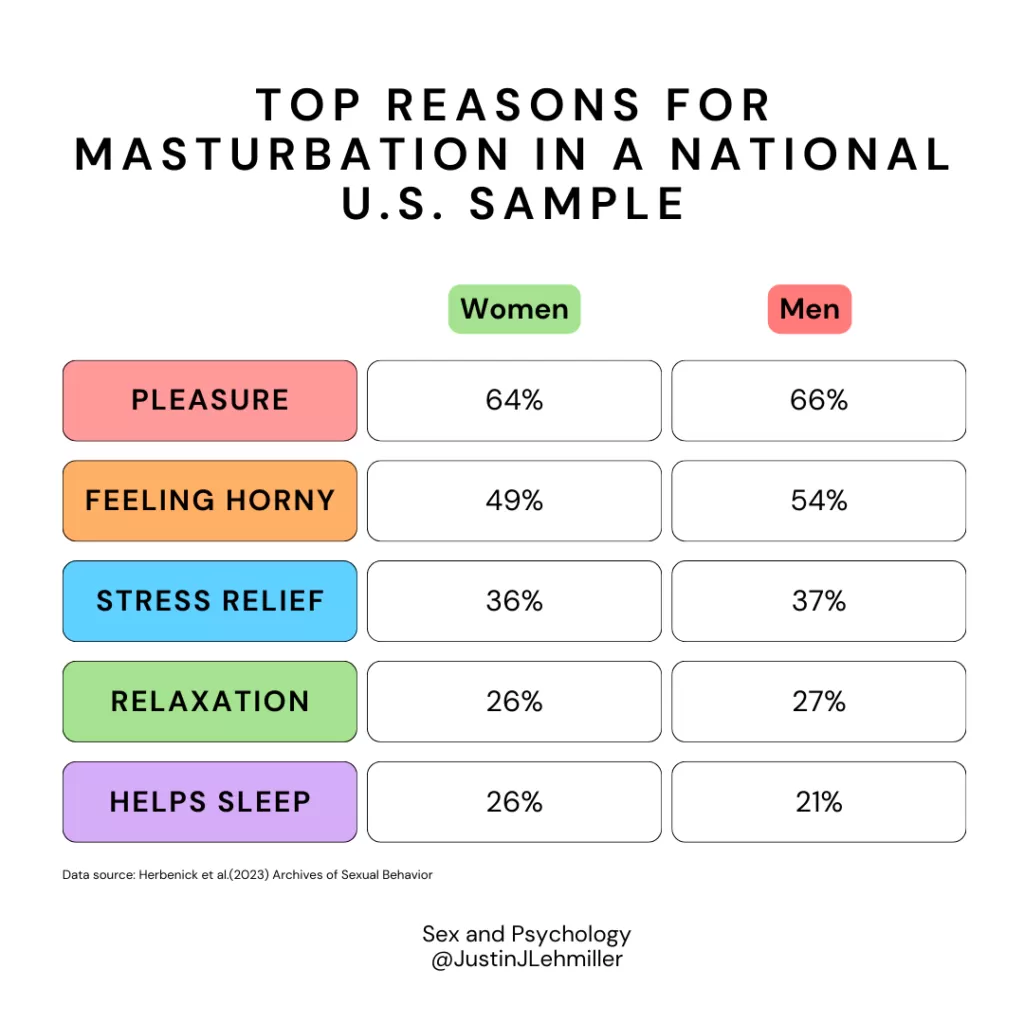As the annual masturbatory abstinence challenge known as “No Nut November” comes to a close, it is a great time to remember all the positives of masturbation. From improved health and self-esteem to the experience of pleasure, engaging in masturbation has a number of benefits.
A recent nationally representative U.S. survey looked at the most common reasons for masturbating, and we’ve included five of the most common ones in the table below [1]. Among these most frequently reported reasons, there were few gender differences between men and women.
No Evidence for No Nut November
No Nut November began when a group of men on the internet challenged each other to see if they could go a full month without masturbating. Their goal? To experience alleged mental focus benefits, heightened testosterone levels, and self-improvement. The challenge has garnered a large following, particularly on Reddit. And in recent years, some women have started joining the contest.
However, despite the number of people who have joined the challenge, little to no research supports the claim that abstaining from masturbation yields these benefits. In fact, most research suggests the exact opposite (i.e.,. that engaging in self-pleasure has more benefits than abstaining).
The Many Benefits of Masturbation
When you orgasm, your brain releases endorphins, which can make you feel both happy and sleepy after climaxing [2]. This is why some people turn to masturbation as a way to relax or help them fall asleep. In this way, masturbating can be a way of temporarily relieving stress and anxiety [3].
Research has also found that masturbation is linked to higher self-esteem [4], perhaps because it can be a way of helping you to better understand and get comfortable with your body. In the aforementioned national US survey, women were significantly more likely than men to report masturbation as a way to explore their sexuality. Masturbation is a form of sexual self-exploration that can tune you into your pleasure sources and facilitate sexual functioning, too. In fact, people who masturbate tend to have an easier time becoming aroused and reaching orgasm in general [5]. As a result, self-pleasure may even boost sexual satisfaction from partnered sex because you know what feels good and what kind of stimulation you need.
Besides pleasure and mental health benefits, there may even be physical health benefits to masturbation. For example, frequent ejaculation is linked to a reduced risk of developing prostate cancer [6], the second most prominent cause of cancer deaths in American men.
Sexual Performance and Science-Based Solutions
Another myth related to No Nut November is that masturbating too frequently or too vigorously can decrease sexual function, such as the ability to maintain an erection and the ability to receive sexual pleasure from a partner. However, this claim has not been substantiated. In fact, researchers have found that there is no link between masturbation frequency and erectile dysfunction [7]. Interestingly, researchers have found that greater participation in anti-masturbation online communities is actually associated with worse symptoms of erectile dysfunction [8]
Some individuals who post in the No Nut November subreddit report participating in the challenge as a way to decrease their “addiction” to porn. Porn addiction is not a recognized medical or psychological diagnosis, and research finds that it’s generally not porn use per se that leads to problems; rather, it’s feeling morally conflicted about consuming porn. Thus, while taking a break from porn might provide some temporary relief for people who are distressed about using porn, it’s unlikely to resolve the underlying feelings of sexual shame that lead people to label themselves as “porn addicts” in the first place.
Recent research investigating the relationship between porn consumption and erectile dysfunction among those participating in anti-porn and anti-masturbation groups found that anxiety is most often the predictor of erectile challenges, while porn consumption does not impact this relationship [9].
No Nut November may be a way that some individuals choose to develop a sense of community online; however, the basis for the challenge is not rooted in science and, instead, appears to be based on the false belief that masturbation is inherently unhealthy.
As masturbation and sexual performance can have a complex relationship with sexual shame, stigma, and anxiety, more effective solutions might involve self-reflection, more education about masturbation and sexual performance, or a chat with a sex therapist.
To learn more about the history of masturbation and myths surrounding it, check out our recent Essential Listen episode, The Truth About Masturbation, with Dr. Erik Sprankle.
This post was written in 2022 by Emily Mendelson, Co-Managing Editor of Sex and Psychology and revised in 2023 by Bethany Lumsdaine, Co-Managing Editor of Sex and Psychology.
Want to learn more about Sex and Psychology? Click here for more from the blog or here to listen to the podcast. Follow Sex and Psychology on Facebook, Twitter (@JustinLehmiller), or Reddit to receive updates. You can also follow Dr. Lehmiller on YouTube and Instagram.
Image Credits: Photo by charlesdeluvio on Unsplash
References:
[1] Herbenick, D., Fu, Tc., Wasata, R. et al. Masturbation Prevalence, Frequency, Reasons, and Associations with Partnered Sex in the Midst of the COVID-19 Pandemic: Findings from a U.S. Nationally Representative Survey. Arch Sex Behav 52, 1317–1331 (2023).
[2] Mitrokostas, S. (2019, January 25). Here’s what happens to your body and brain when you orgasm. ScienceAlert.
[3] Leuner, B., Glasper, E. R., & Gould, E. (2010). Sexual experience promotes adult neurogenesis in the hippocampus despite an initial elevation in stress hormones. PloS One, 5(7), e11597.
[4] Planned Parenthood. (2022). Is masturbation healthy?
[5] Carvalheira, A., & Leal, I. (2013). Masturbation among women: Associated factors and sexual response in a Portuguese community sample. Journal of Sex & Marital Therapy, 39(4), 347–367.
[6] Rider, J. R., Wilson, K. M., Sinnott, J. A., Kelly, R. S., Mucci, L. A., & Giovannucci, E. L. (2016). Ejaculation frequency and risk of prostate cancer: Updated results with an additional decade of follow-up. European Urology, 70(6), 974–982.
[7] Rowland, D. L., Castleman, J. M., Bacys, K. R., Csonka, B., & Hevesi, K. (2022). Do pornography use and masturbation play a role in erectile dysfunction and relationship satisfaction in men? International Journal of Impotence Research, 1–10.
[8] Prause, N., & Binnie, J. (2023). Iatrogenic effects of Reboot/NoFap on public health: A preregistered survey study. Sexualities, 0(0).
[9] Prause N, Binnie J. Reboot/NoFap Participants Erectile Concerns Predicted by Anxiety and Not Mediated/Moderated by Pornography Viewing. Journal of Psychosexual Health. 2022;4(4):252-254. doi:10.1177/26318318221116354


 Anal Beads
Anal Beads Anal Vibrators
Anal Vibrators Butt Plugs
Butt Plugs Prostate Massagers
Prostate Massagers
 Alien Dildos
Alien Dildos Realistic Dildos
Realistic Dildos
 Kegel Exercisers & Balls
Kegel Exercisers & Balls Classic Vibrating Eggs
Classic Vibrating Eggs Remote Vibrating Eggs
Remote Vibrating Eggs Vibrating Bullets
Vibrating Bullets
 Bullet Vibrators
Bullet Vibrators Classic Vibrators
Classic Vibrators Clitoral Vibrators
Clitoral Vibrators G-Spot Vibrators
G-Spot Vibrators Massage Wand Vibrators
Massage Wand Vibrators Rabbit Vibrators
Rabbit Vibrators Remote Vibrators
Remote Vibrators
 Pocket Stroker & Pussy Masturbators
Pocket Stroker & Pussy Masturbators Vibrating Masturbators
Vibrating Masturbators
 Cock Rings
Cock Rings Penis Pumps
Penis Pumps
 Wearable Vibrators
Wearable Vibrators Blindfolds, Masks & Gags
Blindfolds, Masks & Gags Bondage Kits
Bondage Kits Bondage Wear & Fetish Clothing
Bondage Wear & Fetish Clothing Restraints & Handcuffs
Restraints & Handcuffs Sex Swings
Sex Swings Ticklers, Paddles & Whips
Ticklers, Paddles & Whips












